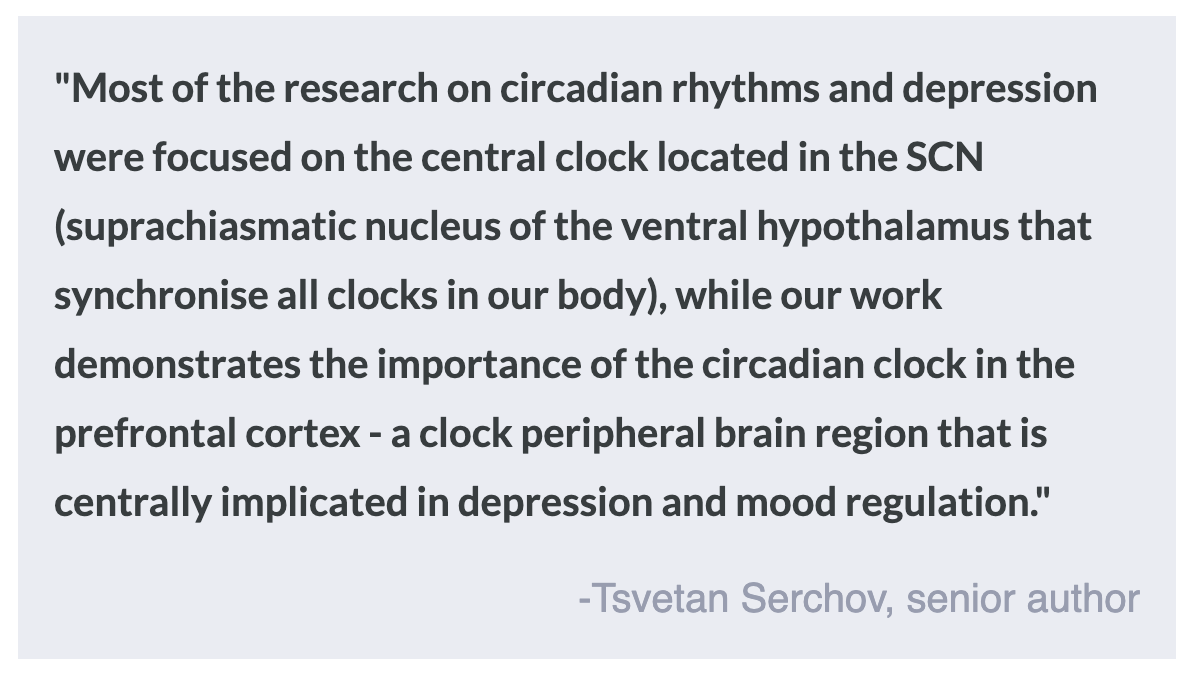A Link Between Circadian Rhythms in the Prefrontal Cortex and Depression
Post by Kelly Kadlec
The takeaway
The circadian clockwork in the medial prefrontal cortex was found to be altered in a mouse model of depression. The authors used pharmacological and genetic modulation of the clock molecular circuits involved to demonstrate a causal role of the circadian clock in mood regulation and show that correcting this dysregulation has an antidepressant effect.
What's the science?
Circadian rhythms are the 24-hour physiological clocks that regulate, among other processes, our sleep. These clocks are often dysregulated in patients with mood disorders, including major depressive disorder (MDD). It is thought that the fastest-acting treatments for MDD, such as ketamine, may be effective because of their interaction with the genes that regulate circadian clocks. These treatments, unfortunately, are often only effective for short amounts of time, which motivates a need for us to better understand the biological mechanisms behind circadian rhythm dysregulation in depression and how these treatments impact them. Last week in Nature Communications, Sarrazin, Gardner, and colleagues demonstrated a causal role for the medial prefrontal cortex (mPFC) in the disruption of circadian clocks in mice that are in a stress-induced depressive state and showed that correcting the circadian clocks in mPFC produces effects similar to that of known antidepressants.
How did they do it?
In this study, wild-type and genetically modified mice were used to study different components of the relationship between circadian rhythms and depressive states. The authors used a mouse model of depression, the chronic behavioral despair paradigm (CDM), to replicate symptoms of depression. These symptoms were evaluated using several behavioral tests, for example, the nose poke sucrose preference test, which is used to measure stress-induced anhedonia (no experience of pleasure) and motivation-oriented behavior.
The authors measured the expression of four main circadian clock genes in brain tissue samples using quantitative reverse transcription PCR (qRT-PCR). They also manipulated the expression of two of these genes using genetic knockout lines where levels of individual circadian clock genes were reduced by half or more. Then, the authors modulated the other two genes pharmacologically. These different manipulations were studied in both the context of how they impacted the behavior of the mice and how these four circadian clock genes may interact with each other and other networks in the brain.
What did they find?
The authors find that four key circadian clock genes in mPFC are altered in mice in depressive states induced by CDM. This was reversed by administering the anti-depressant ketamine.
In addition, the authors genetically reduced the expression of two circadian clock regulators individually and found the expected relationship between these modulations and behavior. Downregulating a positive circadian clock gene in mPFC resulted in depressive-like behaviors. In contrast, reducing the expression of a clock-suppressive gene resulted in antidepressant effects in mice subjected to CDM. Pharmacological manipulation of the other two clock genes revealed that their impacts on behavior were mediated through their action on the positive circadian clock gene.
Finally, the authors show how these genes impact proposed mechanisms of synaptic plasticity which is thought to be critical to the pathology of depression. Increasing an antidepressant clock modulator and administering ketamine both resulted in increases in markers for synaptic plasticity. The reverse was true as well and increasing the depressive clock regulator resulted in decreases in measured plasticity.
What's the impact?
Millions of people live with MDD, and many patients do not respond to current treatment options. The findings in this study demonstrate the potential therapeutic benefits of correcting circadian rhythms, in particular through modulating the activity and expression of clock genes in the mPFC. This provides a target for treatments of depression and furthers our understanding of the molecular mechanisms involved in the pathology of depression.


